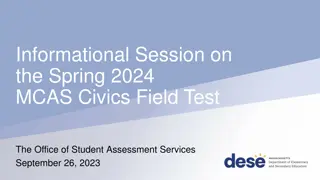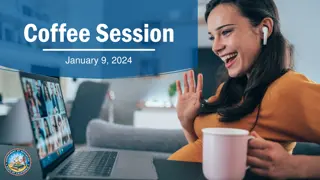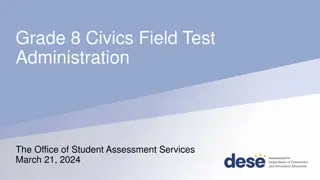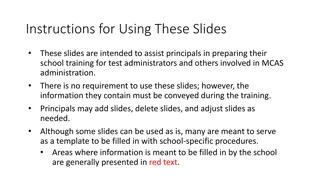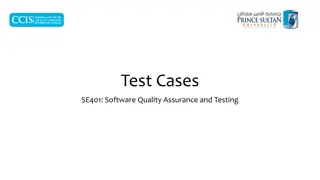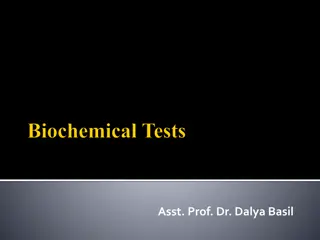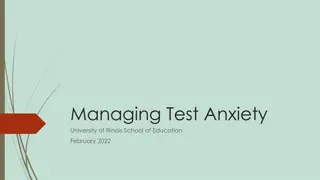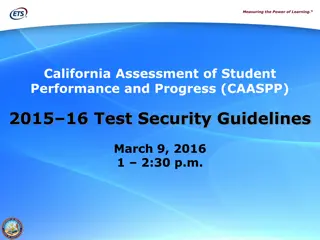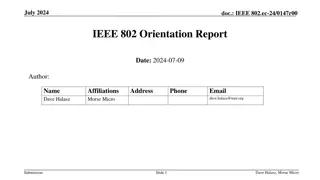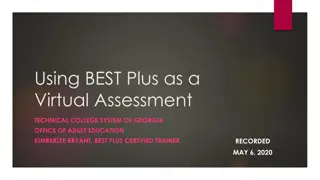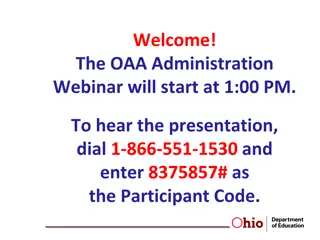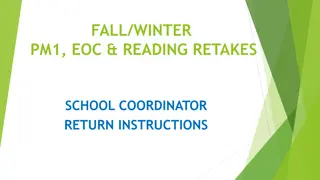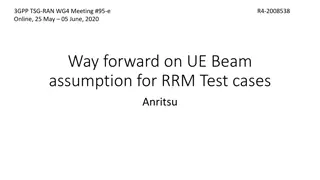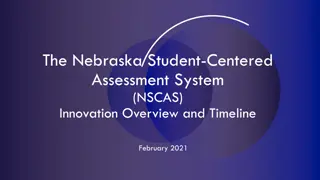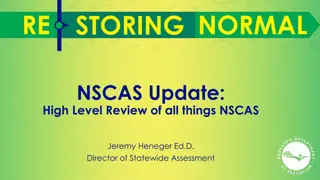NSCAS Test Administration Orientation 2022-2023 Overview
The Nebraska Student-Centered Assessment System (NSCAS) Test Administration Orientation for 2022-2023 provides information on the assessments, security procedures, training goals, and administration guidelines for ensuring fairness and equity in testing. It outlines the security measures, contact information, and key aspects of test administration. The purpose is to maintain test security, standardize procedures, and ensure a secure testing environment. The agenda covers security procedures, testing environment, and test administration steps crucial for educators and students participating in NSCAS assessments.
Download Presentation

Please find below an Image/Link to download the presentation.
The content on the website is provided AS IS for your information and personal use only. It may not be sold, licensed, or shared on other websites without obtaining consent from the author. Download presentation by click this link. If you encounter any issues during the download, it is possible that the publisher has removed the file from their server.
E N D
Presentation Transcript
Nebraska Student-Centered Assessment System (NSCAS) Test Administration Orientation 2022-2023
Questions? Policy Questions should be directed to the Statewide Assessment Office at The Nebraska Department of Education Technology/Administration Management Questions should be directed to the vendor s customer service desk. Contact information for NDE Staff and Vendor Partners is available on the Statewide Assessment Contact Page General Questions can be directed to: nde.stateassessment@Nebraska.gov
NSCAS Administrations for 2022-2023 All security measures apply to the following assessments: Year Subject Grade Level NSCAS Growth Fall, Winter, & Spring English Language Arts & Mathematics 3-8 NSCAS General Science NSCAS Alternate Summative Assessments NSCAS-AA English Language Arts NSCAS-AA Mathematics NSCAS-AA Science NSCAS ACT ELPA21 (For English Learners) *Third-Year Cohort 5 and 8 2022-2023 3-8 & High School* 5, 8, and High School* High School* K-12
Purpose for Test Security In a centralized testing process, it is critical that equity of opportunity, standardization of procedures and fairness to students, teachers, and districts are maintained. Therefore, the Nebraska Department of Education requires that all school districts place a high priority on test security and review the NSCAS Security procedures. Test security includes test maintenance and storage, training of test administrators, test administration, test ethics, and secure return/destruction of materials.
Goals of Security Training To assure that all Nebraska students have the opportunity to be assessed appropriately, fairly, and in a secure manner. To assure that all Nebraska educators understand and follow the steps to develop and maintain a secure NSCAS testing process. To document the practices and procedures so that all staff will correctly follow the steps to assure the security of NSCAS testing.
Agenda Section One: NSCAS Security Procedures Section Two: NSCAS Testing Environment Section Three: NSCAS Test Administration
Test Administration Orientation for 2022-2023 NSCAS SECURITY PROCEDURES
Following all NSCAS Security procedures will assure equitable testing for all students.
Districts are responsible for maintaining test security. Security procedures and documents are included in the NSCAS-testing manuals (Growth, Alternate, ACT & ELPA 21), the SAA Update, and the NSCAS Security Manual. District Assessment Contacts and principals are to have submitted signed security agreements to NDE. The agreements outline principal and DAC security responsibilities.
NSCAS Security Procedures DO NOT: Discuss, disseminate, or otherwise reveal the contents of the test to anyone. Keep, copy, reproduce, examine, or use any test, test item, or any specific test content. Examine responses to any item or any section of a secured test in any manner inconsistent with the instructions provided by the Nebraska Department of Education. Leave students unattended with testing materials.
NSCAS Security Procedures DO NOT: Leave secure test materials alone or in an unsupervised location with students. Secure material should be kept in a locked storage container or in a locked room when not in use. See manuals for additional details for each assessment. Allow students to leave the testing site with the test materials for any reason. Allow students to leave the testing site with scratch paper/reference sheets; or leave them in the garbage. ACT Online scratch paper is returned with test materials, all other scratch paper must be securely destroyed.
NSCAS Security Procedures DO NOT: Allow students to look at any section of the test except the one currently being completed. Coach or provide feedback in any way, which includes answering any questions relating to the contents of the test, before, during, or after the test. Alter, influence, or interfere with a test response in any way or instruct another individual to do so.
NSCAS Security Procedures DO NOT: Allow students to move to alternate testing sites for extended time unescorted or carry their own secure testing materials to the new testing location. Return any test booklet or answer sheet to any student after the test has been completed.
NSCAS Security Procedures DO NOT: Allow the NSCAS assessment to be taken on any computing device that does not allow for the locking of the desktop or operating system for test security. Allow virtualization of a desktop unless the security settings of the computer are held intact and/or approval of a waiver has been granted by the Nebraska Department of Education Assessment Department. Performance, security, and test validity cannot be guaranteed on virtualized desktop environments. The NSCAS testing client should be running natively on the computing device. Allow NSCAS assessments to be taken on unsupported computing devices.
Test Administration Orientation for 2022-2023 NSCAS TESTING ENVIRONMENT
Good organization of test materials and well-communicated procedures will ensure smooth test administration.
NSCAS Testing Environment DO: Provide a testing location that has comfortable seating, sufficient workspace, and good lighting. Make arrangements for rooms and plan seating in advance in order to eliminate confusion when testing begins. The room where students take the test should be as free from outside disturbance as possible. Seat students so they have enough room and will not be tempted to copy other students answers. (Follow guidelines in testing manuals for specific tests).
NSCAS Testing Environment DO: Remove or cover visual aids and clues throughout the administration of all tests. Post a Testing: Do Not Disturb sign on the door to prevent interruptions. Control access to cell phones and other personal electronic devices.
NSCAS Testing Environment DO: Project a positive approach to the test process to help students feel comfortable and relaxed. Prohibit talking during testing process. Provide adequate supervision throughout the testing process. Move around the room to monitor students.
Test Administration Orientation for 2022-2023 NSCAS TEST ADMINISTRATION
In order to ensure accurate achievement results, it is essential that all Test Administrators follow the same procedure when administering tests.
NSCAS Test Administration DO: Read through the pertinent information in the NSCAS Administration manuals, ACT Test Administration manuals, or ELPA 21 test manual prior to the test administration. Distribute necessary test materials to students. Provide students blank scratch paper for statewide summative assessments. For ACT Online, use ACT-provided scratch paper. Printed NSCAS-M grade-specific reference sheet may be provided to each student in grades 4-8.
NSCAS Test Administration DO: Read student directions word for word exactly as printed in test manuals. Use a natural tone and manner when reading directions to students. If a mistake is made when reading, stop and say, No, that is wrong. Listen again. Then read the direction again. Maintain standardized testing procedures.
NSCAS Test Administration DO: Walk around the room while students are working to see that they are following directions and are on task without reading the test items. Follow appropriate protocol by not giving help on specific test questions. Collect scratch paper and/or reference sheets after the students are done testing and submit to the School Test Coordinator for secured destruction or return to testing vendor(ACT). Allow students to read (not allowed on the ACT) or sit quietly while others finish the test.
NSCAS Test Administration Answers to Frequently Asked Questions DO NOT: Play music during testing sessions. Provide refreshments during testing sessions. Require students to have proctor approval to move on or to end their test session.
NSCAS Test Administration DO: Follow appropriate accommodation procedures as found in the NSCAS Accessibility Manual. Follow ACT and ELPA21 appropriate accommodation procedures.
NSCAS Test Administration The majority of assessment irregularities and/or security breaches that have occurred on statewide testing involved: A make-up testing session. A testing session being assigned to a teacher, paraprofessional, substitute teacher, or administrator: who had not had any preparation for test administration procedures or; who may have had preparation but had not originally been assigned to administer NSCAS tests, so had not reviewed test administration procedures. Students being provided unapproved accommodations. Electronic devices such as cell phones. Please assure that everyone who will administer NSCAS tests has clear, organized, and sufficient test administration preparation.
THANK YOU! Contact the Statewide Assessment Office with questions regarding NSCAS Administration. 402.314.3013 nde.stateassessment@nebraska.gov






